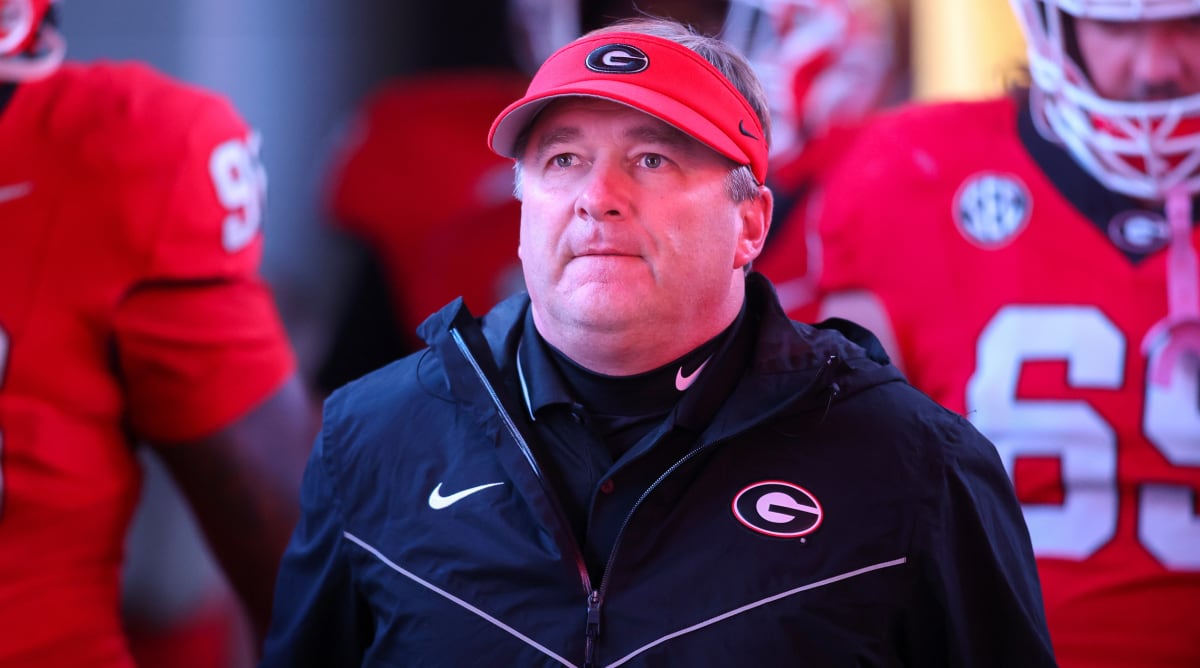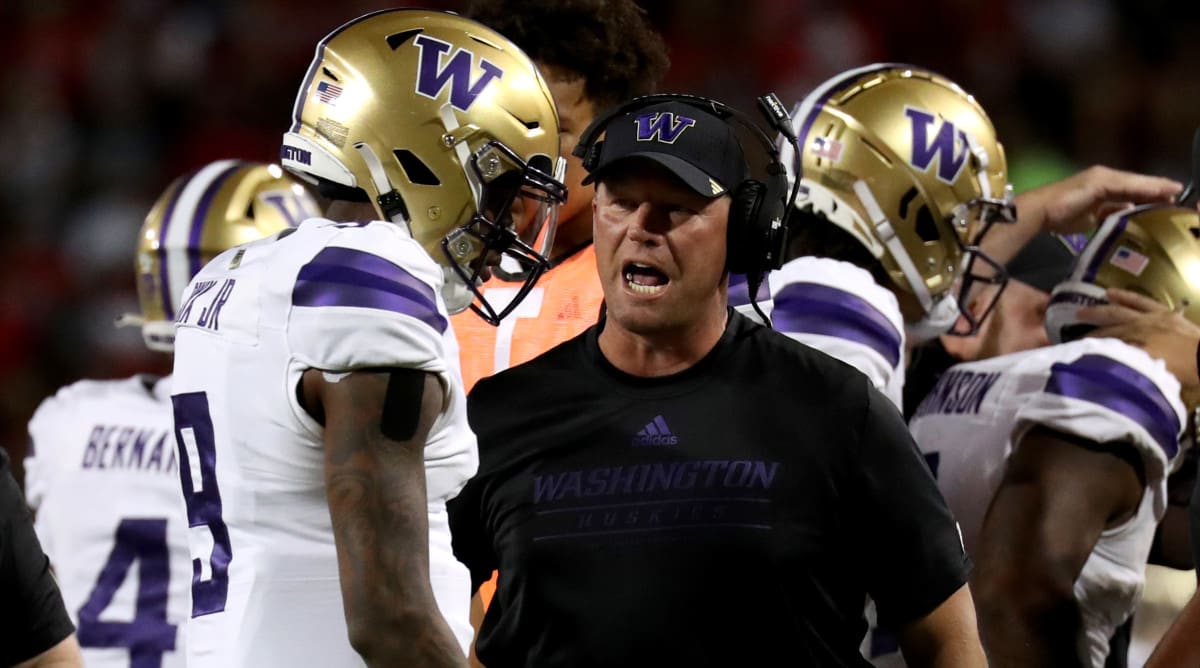Forty names, games, teams and minutiae making news in college football (Christmas movies sold separately in Fayetteville, where the 3–7 Razorbacks could use some holiday cheer):
First Quarter: Texas A&M conundrum | Second Quarter: Melodramatic Michigan
Third Quarter: National Coach of the Year race
The final weeks of the season will help decide a lot of awards, including short lists for national Coach of the Year. There are still plenty of viable contenders. A Dash list, in no particular order:

Brett Davis/USA TODAY Sports
Kirby Smart (21), Georgia. Start with the big dog, the coach of the Bulldogs, the leader of an undefeated team on a 27-game winning streak and seeking a third straight national championship. Despite having an unprecedented 27 players drafted the past two years and losing a star defensive coordinator in 2021 and a star offensive coordinator in ’22, the Georgia machine has rolled on. First-year starting quarterback Carson Beck has grown into the big shoes vacated by Stetson Bennett, and the Dawgs have been undeterred by a large number of injuries—including one that sidelined their best player, tight end Brock Bowers, for nearly three full games.
Nick Saban (22), Alabama. We’re so accustomed to seeing Saban teams rack up victories without much struggle that this season has been something different. The Crimson Tide lost their second game of the season at home by 10 points, then benched their starting quarterback and flailed past South Florida—at that point, the season was on the brink. But vulnerable Alabama has morphed into powerful Alabama, beating Mississippi, Tennessee and LSU each by 14 points on the way to 9–1. This season ranks high among Saban’s many great coaching jobs.
Eli Drinkwitz (23), Missouri. The SEC’s breakthrough team has put it all together in Year 4 under Drinkwitz, rising to 8–2 with wins over Kansas State and Tennessee. For the second straight season, the Tigers have played Georgia better than any other SEC opponent, leading in the second half in Athens before falling by nine points. This is one of the more complete Missouri teams in recent history, ranking fifth in the SEC in both total offense and total defense. Drinkwitz has seized on name, image and likeness opportunities to help recruiting, and has more high-end talent on the way next year.
David Braun (24), Northwestern. No coach started the season in a more difficult spot than Braun, the emergency interim leader who took over when Pat Fitzgerald was abruptly fired during the summer. A first-time head coach, Braun made an immediate impression by handling the crucible of Big Ten media day well in July. But the on-field product still looked bleak when the Wildcats were routed in the opener by Rutgers. Since then, though, a team that some thought could go winless has instead cobbled together a 5–5 record—and that’s with starting quarterback Ben Bryant missing four games. Braun has given the Northwestern administration good reason to make him the full-time head coach.
Mike Norvell (25), Florida State. The four-year building job has been fully achieved, as the undefeated Seminoles are in the thick of the College Football Playoff mix. Norvell has combined deft transfer portal additions with good high school recruiting and player development to create a team that has returned to the top of the Atlantic Coast Conference. After a walkover against North Alabama this week, Florida State will be within two wins of its first 13–0 record since Jameis Winston’s last season, in 2014.
Jeff Brohm (26), Louisville. The school was confident it was getting an upgrade when Scott Satterfield left and created an opportunity for Brohm to return to his hometown and alma mater, but this has gone better than expected. With a combination of improved holdover players and savvy portal additions, the Cardinals are 9–1 against a schedule that features 10 power-conference opponents plus Notre Dame. They can clinch the school’s first ACC title game appearance with a win at Miami (Fla.) on Saturday.
Steve Sarkisian (27), Texas. Sark is on the Norvell Plan, but a year ahead of that schedule. This program is ready for SEC entry, but first there is a lot left to play for this season. The Longhorns are 9–1 in Sark’s third season, living dangerously in recent weeks but still on track to play for the Big 12 title and possibly crash the playoff. Texas has at long last become more physically tough, something Sark put a premium on in recruiting and in mindset. Now we’ll see whether the Horns can keep winning without 1,100-yard rusher Jonathon Brooks, who tore an ACL last week.
Jedd Fisch (28), Arizona. This was a dead program when Fisch arrived, coming off five straight losing seasons, including an 0–5 mess in 2020. His first year was 1–11, then last year the Wildcats jumped up to 5–7, and now they’ve won seven games and are bowl-bound for the first time since ’17. Fisch has done it this year with two quarterbacks, after proven starter Jayden de Laura was injured four games into the season, and freshman Noah Fifita became a spectacular replacement. Arizona is currently on a four-game winning streak, its first since ’19.

Zachary BonDurant/USA TODAY Sports
Three-fourths of the Pacific Northwest (29), where the football is as good as it’s ever been:
Kalen DeBoer, Washington. The Huskies are 10–0 for just the second time in program history. The other time was 1991, when they won a share of the national title. They still have reason to dream of another championship at this point in Year 2 under DeBoer, whose all-time record as a head coach is now a preposterous 100–11. His Huskies aren’t just good; they’re fun to watch: Washington leads the nation in passing offense for the second straight season, with a vertical game that can strike at any time.
Dan Lanning, Oregon. The other second-year star coach in the PNW, Lanning has won 19 of his first 23 games as a college head coach. The Ducks are a heartbreaking loss at Washington away from being the lone unbeaten in the Pac-12 and could be favored in a rematch in Las Vegas if it comes to fruition. The best news for Oregon fans: Lanning on Monday forcefully shot down speculation that he could be a candidate at Texas A&M and elsewhere.
Jonathan Smith, Oregon State. Smith’s job has always been harder than most of the rest in the Pac-12, but that hasn’t stopped him from building a legitimate contender in Corvallis. The Beavers are 8–2 and have their fate in their hands, hosting Washington on Saturday and visiting Oregon on Nov. 25. Win both, and they’ll play for the Pac-12 title against one of the schools abandoning the Beavers for another league next year.
Candidates from the Group of 5 (30):
Jamey Chadwell, Liberty. The guy who put Coastal Carolina on the map is 10–0 in his debut season at Liberty. The Flames have some advantages over their Conference USA brethren, but Chadwell has taken them up another level. He’s turned quarterback Kaidon Salter into Grayson McCall 2.0. Chadwell’s name could be in play at Mississippi State.
Curt Cignetti, James Madison. The Dukes are transitioning from FCS and might be wondering what’s so hard about this FBS level. They’re 10–0 and leading the nation in rushing defense in their fifth season under Cignetti, who is now 51–8 at JMU.
Barry Odom, UNLV. The Rebels have had absolutely no notable success in modern times. Odom is changing that immediately, going 8–2 in his first season—and that’s after being jilted by offensive coordinator Bobby Petrino just weeks after hiring him. UNLV is trying to win just the second conference title in school history; the other was in 1984 in the Pacific Coast Athletic Association, which was subsequently vacated for NCAA violations.
Rhett Lashlee, SMU. The quarterback who threw for 3,500 yards in Lashlee’s debut season of 2022 hit the portal. So Lashlee plugged in the next guy, sophomore Preston Stone, and the production at that position has been nearly identical. The overall SMU team has been better, going 8–2, and the Mustangs are tied for first in the American Athletic Conference.
Jason Candle, Toledo. The Rockets are 9–1, and the only loss was in the season opener by two points to Illinois on a field goal with five seconds left. They’re once again the team to beat in the Mid-American Conference.







